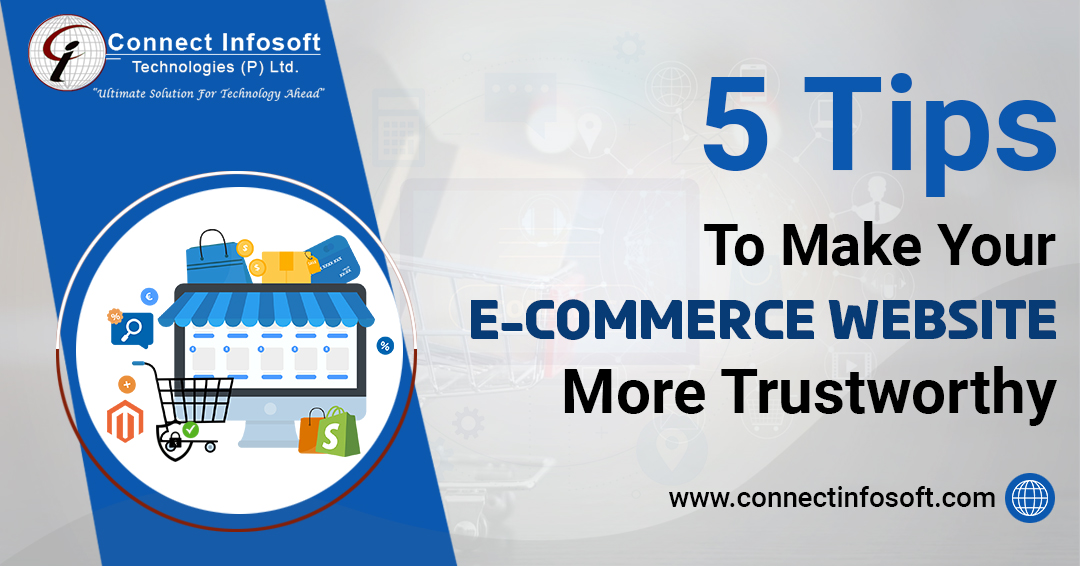5 Tips to Make Your eCommerce Site More Trustworthy | Connect Infosoft

Looking to improve the credibility and trustworthiness of your e-commerce website? You're in the right place! Here are five tips recommended by experts in e-commerce development services that can help boost trust and sales on your mobile-friendly e-commerce website:
Clear Product Information:
One of the biggest concerns for online shoppers is purchasing a product without sufficient information about it. Make sure your product pages have clear and comprehensive descriptions, high-quality images, and user reviews if possible. Provide all necessary details such as product specifications, sizing, and shipping information to reassure your customers that they are making an informed purchase.
Secure Checkout Process:
Customers are increasingly cautious when it comes to online security, and a poorly designed or non-secure checkout process can raise red flags. Provide multiple payment options and display trust badges and security seals to help your customers feel safe during the checkout process. You can also make use of SSL certificates to encrypt user data, ensuring their financial information is secure.
Contact Information:
Having clear and accessible contact information on your e-commerce website can help your customers feel more comfortable in doing business with you. Display a phone number, email address, or live chat support to provide customers with assistance whenever they need it.
Professional Web Design:
An unprofessional-looking e-commerce website can be a major turnoff for potential customers. Ensure your website is well-designed, visually appealing, and user-friendly. Incorporate an intuitive layout, high-quality graphics, and easy navigation to enhance the overall user experience.
Social Proof:
Reviews and testimonials can be powerful tools for building trust and credibility for your e-commerce business. Display customer feedback and reviews prominently on your website and social media platforms to show that your products are trusted and valued by others.
By following these tips from experts in e-commerce development services, you can create a trustworthy and reliable mobile-friendly e-commerce website that meets the needs of today's online shoppers. Incorporate these elements into your website design and user experience to drive sales and customer loyalty.
Why is Trust In eCommerce So Important?
Consumer Confidence:
Trust is the foundation of any successful business relationship, including eCommerce. When consumers trust an online retailer or platform, they feel confident in making purchases and providing their personal and financial information online. It reduces their concerns about fraud, data breaches, or receiving counterfeit products.
Reputation and Brand Loyalty:
Trust is closely tied to a company's reputation. Positive customer experiences and a trustworthy reputation help build brand loyalty. Satisfied customers are more likely to become repeat customers and recommend the brand to others, leading to increased sales and growth.
Security and Privacy:
Trust is essential for ensuring the security and privacy of customers' personal and financial information. eCommerce platforms must implement robust security measures, such as encryption, secure payment gateways, and data protection protocols. Demonstrating a commitment to customer privacy and data security builds trust and reassures consumers that their information is safe.
Transparency and Communication:
Trust in eCommerce also relies on transparent and effective communication. Providing clear product descriptions, accurate pricing, shipping details, return policies, and responsive customer support creates a sense of trust. Open and honest communication helps manage customer expectations and resolves any issues or concerns promptly.
Social Proof and Reviews:
Trust is often influenced by social proof, which includes customer reviews and ratings. Positive reviews and testimonials from satisfied customers can help build trust in an eCommerce brand or product. Companies that actively encourage and manage customer reviews demonstrate transparency and value customer feedback, which further enhances trust.
Competitiveness:
In today's highly competitive eCommerce landscape, trust becomes a differentiating factor. Consumers have numerous options when it comes to online shopping, and they are more likely to choose platforms they trust. Building trust can give an eCommerce business a competitive edge and help attract and retain customers.
International Reach:
eCommerce has made it possible for businesses to reach customers worldwide. However, cross-border transactions often involve unfamiliar companies and different legal frameworks. Trust plays a critical role in enabling international eCommerce by bridging cultural and geographical gaps and providing reassurance to global customers.
5 Ways to Inspire Trust in eCommerce Online Transactions
Building trust is crucial in eCommerce transactions to reassure customers and encourage them to make online purchases. Here are five effective ways to inspire trust in eCommerce online transactions:
- Use secure payment methods like PayPal or Stripe.
- Display trust seals and certifications.
- Clearly communicate policies for returns, refunds, and shipping.
- Feature customer reviews and testimonials.
- Provide reliable customer support.
These steps will build confidence and encourage online purchases.
Optimizing and The Importance of Trust in eCommerce
Optimizing and establishing trust are both critical aspects of running a successful eCommerce business. Let's delve into each of these areas and explore their importance.
Optimizing eCommerce:
- User Experience (UX): Focus on creating a seamless and user-friendly online shopping experience. Ensure that your website is well-designed, easy to navigate, and mobile-responsive. Streamline the checkout process to minimize friction and make it effortless for customers to complete their purchases.
- Website Performance: Optimize your website's loading speed and overall performance. Slow-loading pages can lead to customer frustration and abandonment. Regularly monitor and optimize your site's performance to provide a smooth and efficient browsing experience.
- Search Engine Optimization (SEO): Implement effective SEO strategies to improve your website's visibility in search engine results. This involves optimizing your product descriptions, titles, meta tags, and other relevant content to rank higher in search engine rankings. Higher visibility can lead to increased traffic and potential sales.
- Personalization: Utilize customer data and analytics to personalize the shopping experience. Offer product recommendations based on customers' browsing and purchase history, send targeted marketing emails, and provide personalized offers. Tailoring the experience to individual customers can enhance engagement and foster loyalty.
The Importance of Trust in eCommerce:
- Consumer Confidence: Trust is the foundation of any successful eCommerce business. When customers trust your brand, they feel confident in making online purchases. Building trust reduces the perceived risks associated with online transactions, such as fraud or data breaches.
- Repeat Business and Loyalty: Trustworthy businesses have higher customer retention rates. When customers have a positive experience and trust your brand, they are more likely to become repeat buyers and recommend your products or services to others.
- Reputation and Brand Image: A reputation for trustworthiness can differentiate your business from competitors. Positive word-of-mouth and online reviews based on trust can significantly impact your brand's image and attract new customers.
- Reduced Cart Abandonment: Building trust helps alleviate concerns that often lead to cart abandonment. By implementing trust-building measures, such as secure payment methods, transparent policies, and positive customer reviews, you can increase the likelihood of customers completing their purchases.
- Business Growth: Trust is closely linked to business growth. As more customers trust your brand, they are more willing to engage in larger transactions, leading to increased sales and revenue.


